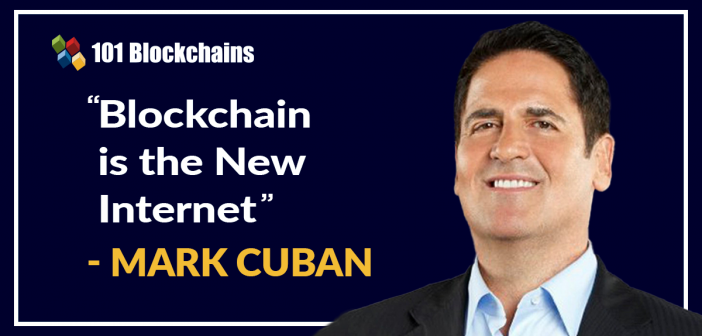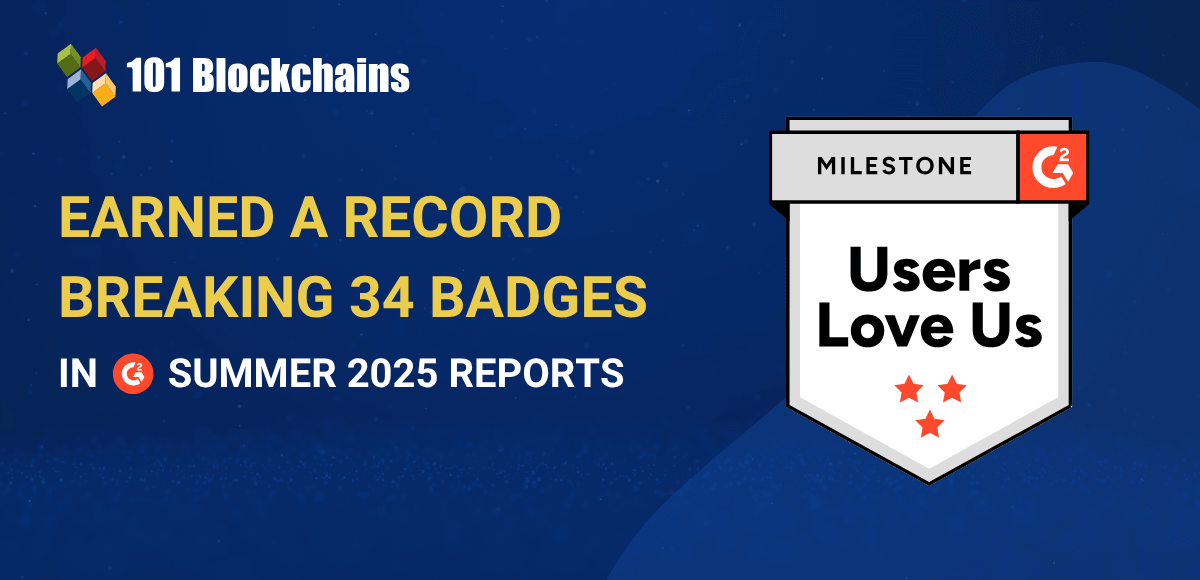Learn how blockchain truly works, master key definitions, and uncover what makes smart contracts so "smart." Dive into the fundamentals, gain valuable insights, and start your blockchain journey today!

- News & Updates
101 Blockchains
- on March 10, 2021
Mark Cuban Predicts Blockchain is the New Internet
The future of blockchain technology is one of the hottest topics all over the world. While blockchain finds its way into almost every major industry such as healthcare, banking, and finance alongside finding applications in governance, experts are wondering about the prospects it has for the future. According to self-made billionaire Mark Cuban, blockchain is the new internet.
However, the statement of Mark Cuban doesn’t reflect on the possibilities of blockchain technology replacing the internet completely. On the contrary, Mark Cuban reflected on the similarities between the existing state of blockchain technology and the internet during its initial days.
Mark Cuban spoke in an interview with the founder and CEO of Real Vision, Raoul Pal, on February 9 about the potential for growth in new innovations and companies out of the pandemic. The Dallas Mavericks owner stated that the evolution of blockchain technology and the development of companies around the idea of blockchain would become a prominent highlight.
Blockchain is basically a decentralized digital ledger with the capabilities of documenting transactions. However, the development of blockchain brings the thoughts of the early days of the internet to the minds of Cuban. According to Cuban, no one really knows about the possibilities with blockchain, thereby leading to many projections and estimates.
Cuban started an internet radio company in 1995 with a friend, Todd Wagner. Many people were apprehensive of the decision of Cuban to start an internet broadcasting service and disregarded the idea. However, Cuban went ahead with his venture and established Broadcast.com in 1995. A few years later, Yahoo acquired Broadcast.com for $5.7 billion in stock in 1999. Cuban draws major similarities between blockchain and internet companies.
According to Cuban, “It was not quick and definitely took time as we waited for availability of bandwidth and cost reduction to ensure that cord-cutting and streaming can actually happen.” He added that “Now, this is a time when we had already seen 20 years of the internet. So, with just 10 or 12 years into the world of crypto after we came across Bitcoin, it is safe to say that blockchain is the new internet”. Cuban expressed his positive views for the long-term growth of mainstream applications of blockchain technology.
The Shark Tank star expressed his opinions in a podcast with The Defiant while showing optimism about crypto and, specifically, DeFi or decentralized finance. In his podcast with The Defiant, Mark Cuban also pointed out this perception of Bitcoin as a store of value rather than as a currency. He openly declared that he is still not convinced about Bitcoin becoming a currency one day.
Furthermore, the views of Mark Cuban have always reflected on his optimism regarding the future of blockchain, saying blockchain is the new internet. In one of his views, he had proposed that governments worldwide should create their own digital coins because they are cheaper. Cuban had stated that governments lose money on minting coins, and conventional methods of currency creation need improvements. In addition, Cuban also termed fiat money as unsustainable and untenable while also presenting doubts regarding the collapse of all fiat money.
Cuban had also predicted that governments would slowly sell off shares of their gold reserves and place their earnings in Ethereum or Bitcoin as they dive deeper into digital currencies.
The self-made billionaire also reflected on the uncertainty regarding the future of blockchain. He attributed trust as a major factor in applications of blockchain technology. The use of blockchain brings many questions to the table, such as who to trust, how to trust, and what to trust. For example, Bitcoin miners rely on algorithmic scarcity for establishing trust in transactions.
However, algorithmic scarcity is also associated with considerable amounts of underpinning trust. Users must trust that electricity rates, availability, and other factors would not reach 51% as it represents the proportion of computing power needed for hijacking a blockchain network. Although the task of procuring such a massive volume of resources appears too difficult, Mark Cuban advises caution.
One of the most common analogies that Mark Cuban refers to for blockchain is thatit is parallel with internet technology which specifies Blockchain is the new Internet. The first similarity between blockchain and internet is the fact that there were limited early adopters of both technologies. Gradually, the internet became omnipresent. According to Cuban, smart contracts could work as the boosting platform for blockchain. Smart contracts could enable widespread adoption of blockchain for use cases across different industries.
Cuban reflects profoundly on the role of smart contracts for taking blockchain technology towards large-scale adoption. Mark Cuban equally admires Ethereum and decentralized finance. Ethereum was created to support the use of smart contracts in blockchain development. Now, DeFi services have resulted in the development of a complete financial infrastructure over the blockchain. DeFi services use smart contracts for creating protocols that can replace the existing financial services in different ways. Interestingly, blockchain can ensure that the new smart contract-based protocols are unconditionally interoperable and transparent.
According to Cuban, “Smart contracts are definitely real and the perfect mirror showing me the early days of the internet. Now, you need only basic JavaScript and HTML skills to run your online business. Banking is slowly becoming friction-free, and you can borrow money in seconds. Users with $200 in Bitcoin or Ether could wrap it and then borrow $100 at 2.3% within 15 seconds. That’s some incredible speed and can definitely create disruptions for the banking industry”.
The views of Mark Cuban definitely present a positive viewpoint on the future of blockchain technology. Cuban is right in believing blockchain is the future internet because of the limited number of early adopters. However, he has also presented the notion of competitive prospects for early adopters.
For example, the early adopters in the internet tech bubble included Amazon and eBay. They are working out quite fine now as the internet tech has become ubiquitous. The same is applicable in the case of blockchain technology which has just crossed the trough of disillusionment. Individual users and institutions are slowly considering the applications of blockchain beyond the margins of cryptocurrency. Let us wait and watch where blockchain technology goes in the next few years!




